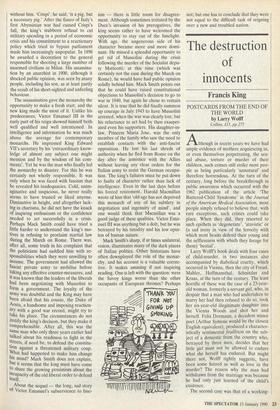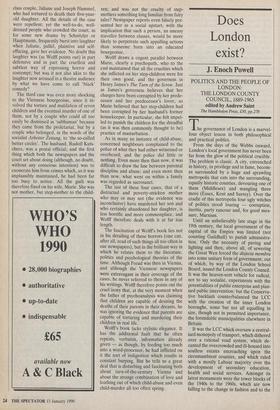The destruction of innocents
Francis King
POSTCARDS FROM THE END OF THE WORLD by Larry Wolff
Collins, £15, pp.275
Although in recent years we have had ample evidence of mothers acquiescing in, or even themselves perpetrating, the sex- ual abuse, torture or murder of their children, such crimes still strike most peo- ple as being particularly 'unnatural' and therefore horrendous. At the turn of the century, long before the breakthrough in public awareness which occurred with the 1962 publication of the article The Battered-Child Syndrome' in the Journal of the American Medical Association, most people simply refused to believe that, with rare exceptions, such crimes could take place. When they did, they resorted to such epithets as 'degenerate', 'atavistic' or (a sad irony in view of the ferocity with which most beasts defend their young and the selflessness with which they forage for them) 'bestial'.
Larry Wolff's book deals with four cases of child-murder, in two instances also accompanied by diabolical cruelty, which occurred in Vienna, then the city of Freud, Mahler, Hoffmansthal, Schnitzler and Kraus, at the turn of the century. The least horrific of these was the case of a 23-year- old woman, formerly a servant girl, who, in despair that a man who had undertaken to marry her had then refused to do so, took her six-year-old illegitimate daughter into the Vienna Woods and shot her and herself. Felix Dormann, a decadent minor poet (Arthur Symons would be the closest English equivalent), produced a character- istically sentimental feuilleton on the sub- ject of a domestic from the country who, betrayed by three men, decides that her little girl must not be allowed to endure what she herself has endured. But might there not, Wolff rightly suggests, have been some hatred as well as love in the murder? The reason why the man had withdrawn from the marriage was because he had only just learned of the child's existence.
The second case was that of a working- class couple, Juliane and Joseph Hummel, who had tortured to death their five-year- old daughter. All the details of the case were repellent; yet the well-to-do, well- dressed people who crowded the court, as for some new drama by Schnitzler or Hauptmann, frequently burst into laughter when Juliane, pallid, plaintive and self- effacing, gave her evidence. No doubt this laughter was (as Wolff points out) in part defensive and in part the cruellest and subtlest way of expressing horror and contempt; but was it not also akin to the laughter now aroused in a theatre audience by what we have come to call 'black' comedy?
The third case was even more shocking to the Viennese bourgeoisie, since it in- volved the torture and mutilation of seven children and the eventual murder of one of them, not by a couple who could all too easily be dismissed as 'subhuman' because they came from the proletariat, but by a couple who belonged, in the words of the socialist Arbeiter Zeitung, to 'the so-called better circles'. The husband, Rudolf Kuts- chera, was a postal official; and the first thing which both the newspapers and the court set about doing (although, no doubt, without any conscious intention) was to exonerate him from crimes which, so it was implausibly maintained, he had been far too busy to notice. All the guilt was therefore fixed on his wife, Marie. She was not mother, but step-mother to the child- ren; and was not the cruelty of step- mothers something long familiar from fairy tales? Newspaper reports even falsely pre- sented her as a social upstart, with the implication that such a person, an uneasy traveller between classes, would be more likely to perpetrate such appalling actions than someone born into an educated bourgeoisie.
Wolff draws a cogent parallel between Marie, clearly a psychopath, who to the end maintained that all the cruelties which she inflicted on her step-children were for their own good, and the governess in Henry James's The Turn of the Screw. Just as James's governess believes that her charges have been corrupted by her prede- cessor and her predecessor's lover, so Marie believed that her step-children had been corrupted by her husband's former housekeeper. In particular, she felt impel- led to punish the children for the dreadful (as it was then commonly thought to be) practice of masturbation.
As in many an instance of child-abuse, concerned neighbours complained to the police of what they had either witnessed or overheard; and the police did little or nothing. Even more then than now, it was difficult to draw the line between parental discipline and abuse; and even more then than now, what went on within a family was regarded as sacrosanct.
The last of these four cases, that of a distracted and poverty-stricken mother who may or may not (the evidence was inconclusive) have murdered her son and who certainly abandoned her daughter, is less horrific and more commonplace, and Wolff therefore deals with it at far less length.
The fascination of Wolff s book lies not in his detailing of these horrors (one can, after all, read of such things all too often in our newspapers), but in the brilliant way in which he relates them to the literature, politics and psychological theories of the time. Although Freud was then in Vienna, and although the Viennese newspapers were extravagant in their coverage of the cases, he never referred to them in any of his writings. Wolff therefore points out the cruel irony that, at the very moment when the father of psychoanalysis was claiming that children are capable of desiring the deaths of their parents in their dreams, he was ignoring the evidence that parents are capable of torturing and murdering their children in real life.
Wolff' s book lacks stylistic elegance. It has the additional fault that he often repeats, verbatim, information already given — as though, by feeding too much into a word-processor, he had inflicted on it the sort of indigestion which results in constant burping. But he tells us a great deal that is disturbing and fascinating both about turn-of-the-century Vienna and about the strange combination of love and loathing out of which child-abuse and even child-murder all too often spring.











































 Previous page
Previous page